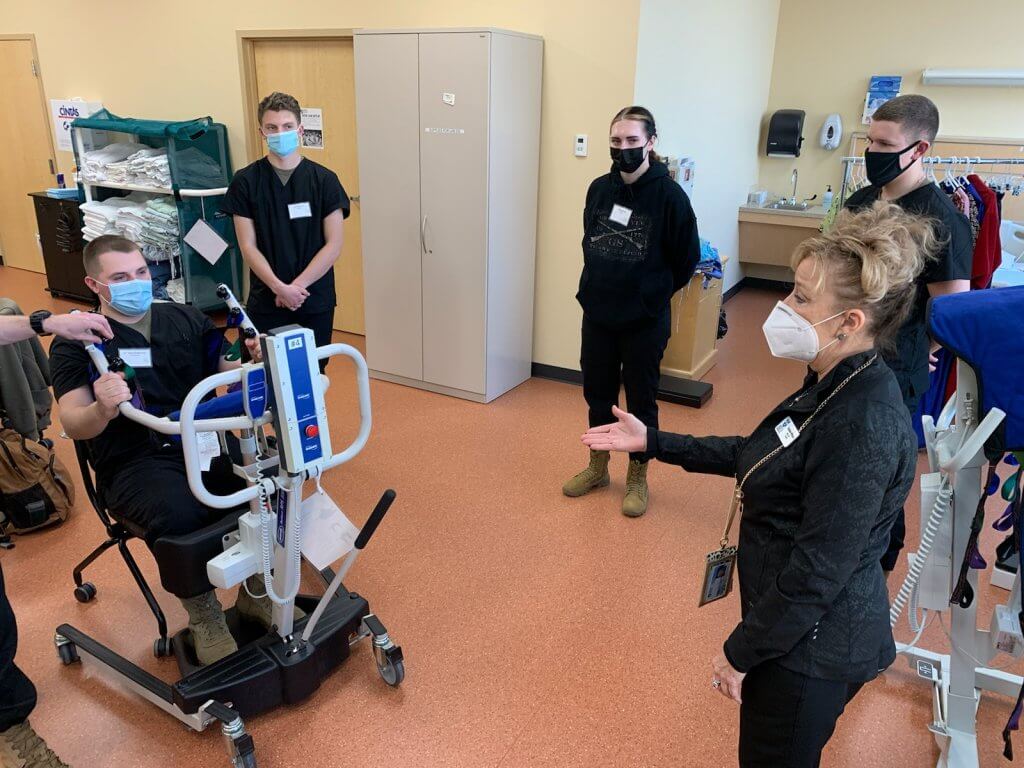Wisconsin guardsmen volunteering to become certified nursing assistants are ultimately serving more than just patients.
“The [civilian] CNAs are tired – quite frankly, they’re exhausted,” said Wisconsin Air National Guard Master Sgt. Dyann Eding, an Air Force medic who leads a team of CNAs at the Southern Wisconsin Center. “It’s a difficult, physically and emotionally demanding job, and I think people are burnt out and looking for other options. We in the Guard were able to step in to offer assistance and maybe an extra set of hands for them to take the day off.”
The guardsmen have been asked to support nursing shortages at a time when Dr. Lisa Greenwood, Madison College’s associate dean of nursing, said the health care system is strained.
“We simply do not have enough staff to care for all those who are ill,” she said. “This historic partnership between Madison College and the National Guard is critical in providing Wisconsin communities and the health care industry the help they desperately need in the fight against COVID-19.”
More than 200 Wisconsin guardsmen have raised their hand for the volunteer-only mission and attended the 75-hour Emergency Nursing Aide training at Madison College. After their training, they worked shifts inside hospitals and long-term care facilities across the state. In a press release, Wisconsin Gov. Tony Evers said the collaboration allows hospitals to increase their capacity by at least 200 beds.
RELATED: National Guard Bureau’s suicide prevention focuses on messaging, reducing stigma
Three waves of about 70 students have completed the CNA courses since November 2021. Wisconsin ARNG Staff Sgt. Harrison Smith was among the first wave of students and now serves as the site non-commissioned officer in charge at a residential treatment facility. Outside of this mission, Smith is a weapons squad leader with the 2nd Battalion, 127th Infantry Regiment. He said his team of CNAs are from varied professional backgrounds but have stepped up to the challenge with minimal experience in the medical field.
“We are all [Military Occupational Specialties]: 11-Bravos, 68-Whiskies, 88-Mikes. You name it, we have them on the team,” he said. “I think there’s a strong willingness to serve in the community. And, to do what they joined the Guard to do; to help Wisconsin and help the Wisconsin National Guard achieve its missions.”
CNAs tasks include assisting patients with activities of daily living like eating, bathing and moving from one place to another. Members who volunteered but haven’t been able to attend the CNA qualification course act as TNAs, or trained nursing assistants. TNA’s serve in more nonclinical roles after receiving site-specific training. They work with kitchen staff to prepare patient meals per prescribed dietary requirements and support nurses with labor-intensive tasks like lifting patients.
All service members working at health care facilities also are required to go through the site’s onboard training and background checks.
Wisconsin ARNG 1st Lt. Anthony Pinchuk said his priority as the CNA Company commander includes ensuring the mental health of the soldiers and airmen in his charge. While the mission is interesting and new, he recognizes these stressors on top of service members being stationed away from their homes.
To mitigate these risks, Joint Task Force COVID Response has deployed a religious support team and psychologist for guardsmen to access freely. There’s also an importance placed on seeing members outside of work for morale events or group fitness sessions.
The program is unique in that its nearly modeling an internship where students utilize learned skills in real-world organizations while networking with professionals in their chosen field. There’s even a plan to exchange service members’ contact information with the sites for members who’d like to continue working as CNAs after their orders are up.
“Some service members are actually looking to get hired on and the sites want to retain them,” Pinchuk said. “As horrible as the pandemic has been, it really has opened doors for some.”

